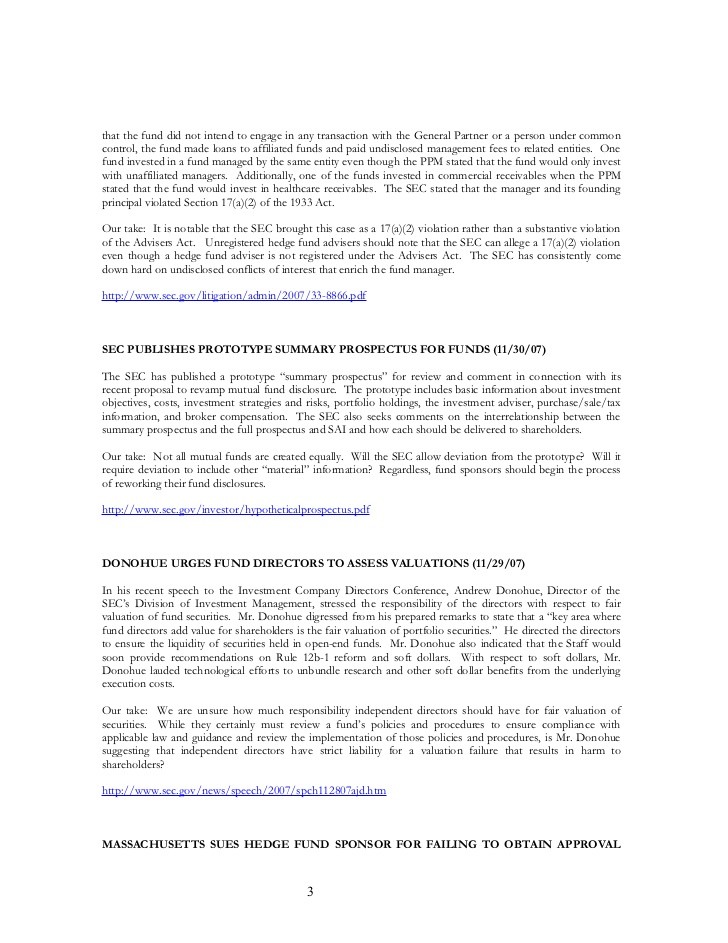SEC proposes to tighten rules on 12b1 mutual fund fees
Post on: 29 Март, 2015 No Comment

By Zachary A. Goldfarb
Washington Post Staff Writer
Thursday, July 22, 2010
Are mutual funds overcharging investors?
Securities and Exchange Commission Chairman Mary Schapiro, in gentler terms, asked as much Wednesday as the agency proposed new rules to govern mutual fund fees.
The mutual fund fees at issue, known as 12b-1 fees, are little-known annual charges that SEC officials worry are making some investors pay more than they realize to invest in mutual funds. As originally set up, 12b-1 fees go to pay for marketing mutual funds to new investors and to compensating brokerages that sell shares in the funds.
Investors often can choose to pay an upfront charge, typically 2 to 5 percent of the amount invested, when they commit money to a mutual fund. Then they pay a small annual 12b-1 fee, up to 0.25 percent, for the entire time they own shares in the fund. Or investors can choose to pay no upfront charges and then pay a larger annual 12b-1 fee, up to 1 percent, for the time they own shares in the fund. Investors can’t shop around for the best deals on mutual funds because brokerages cannot compete with one another on fees.
The SEC is looking at turning this system on its head out of concern that investors don’t know that they’re paying the 12b-1 fees — sometimes years after they invested in the fund. Despite paying billions of dollars, many investors do not understand what 12b-1 fees are, and it’s likely that some don’t even know that these fees are being deducted from their funds or who they are ultimately compensating, Schapiro said on Wednesday.
Under the new mutual fund fee system envisioned by the SEC, investors could still choose to pay an upfront or an annual fee. But investors wouldn’t expect to pay out as much money over time because of new caps on the annual fee. Investors wouldn’t pay out more over time in annual fees than they would have, had they paid the upfront fee.
Unlike now, these sales charges would be listed as such in mutual fund disclosures. The term 12b-1 fee would disappear.
In addition, all mutual funds could charge up to 0.25 percent of assets in an annual marketing fee. This fee could be charged forever.
Finally, brokerages would be able to strike deals with mutual funds to sell shares with discounted fees. The SEC hopes the competition would drive down mutual fund fees.
The proposal would not affect no-load funds, which typically do not charge such fees.
The mutual fund industry, which has defended 12b-1 fees as an important source of revenue for funds, held back judgment on the proposal.
The fees have proven over time to be a highly efficient and tax-effective method for covering the costs of a range of services that are valuable and important for mutual fund investors, said Paul Stevens, head of the Investment Company Institute. We look forward to reviewing and commenting on the SEC’s proposed reforms to the 12b-1 rule, which will impact literally millions of investors, thousands of funds and myriad financial intermediaries.
Also Wednesday, the SEC voted to amend the disclosures investment advisers provide clients. The SEC wants to require advisers to give clients brochures containing plain English narratives describing advisers’ businesses, services and conflicts of interest. The SEC also wants these brochures to put on the agency’s Web site and be available to the public.














